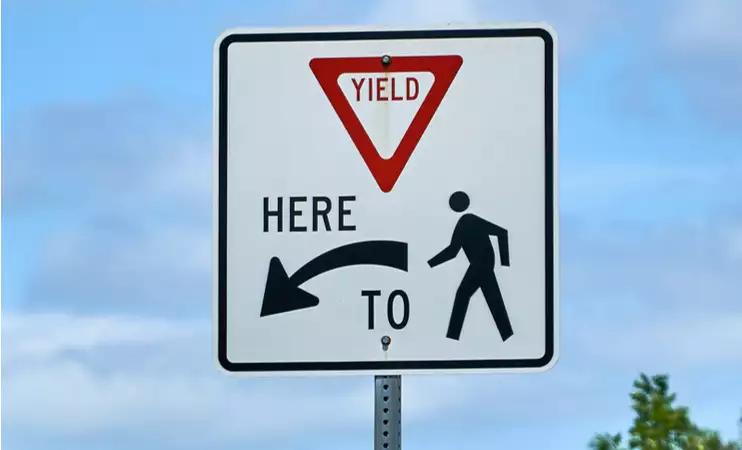
In Texas, right-of-way laws determine who has the legal right to proceed first in various traffic situations. Whether you’re a driver, a pedestrian, or navigating a parking lot, understanding the right-of-way can prevent accidents and legal complications. In this article, you learn about pedestrians, intersections, and parking lot right-of-way rules, and how these laws can impact your car accident claim in Texas.
Pedestrian Right-of-Way Rules
Pedestrians play a vital role in our transportation system, and Texas law recognizes their rights. According to the Texas Transportation Code, pedestrians generally have the right-of-way when crossing a roadway at a marked or unmarked crosswalk. Texas pedestrian’s right of way is limited.
Drivers must yield and give pedestrians ample time and space to cross the road safely. However, it’s important for pedestrians to exercise caution and not enter traffic unexpectedly. Always ensure it’s safe before crossing, and obey any traffic signals or signs.
Intersection Right-of-Way Rules
In Texas, intersections can be complex traffic situations, but there are general guidelines for determining who has the right-of-way. When two vehicles arrive at an uncontrolled intersection simultaneously, the vehicle on the right has the right-of-way. Texas’s right-of-way law can often be confusing.
At controlled intersections with traffic lights or stop signs, drivers must obey the signals and yield to any vehicles or pedestrians with the right-of-way. Additionally, when turning left, drivers must yield to oncoming traffic unless they have a protected left turn signal.
Parking Lot Accident Rules
Parking lots can be busy and chaotic, making it crucial to know the right-of-way rules to prevent accidents and conflicts. In Texas, parking lots are considered private property, and different rules apply compared to public roads. The parking lot right of way or right of way in a parking lot can be harder to prove than on a public highway. Right-of-way laws in Texas depend on specific circumstances.
Parked Cars
Generally, drivers in the main thoroughfare of the parking lot have the right-of-way over those pulling out of parking spaces. However, be vigilant and yield to pedestrians, as they always have the right of way. Patience and awareness are key to avoiding collisions when driving in parking lots. Texas private parking lot laws can be complicated, so careful analysis is necessary.
Merging Traffic on Texas Highways

Texas laws regarding merging traffic on Texas highways and freeways are outlined in Section 545.061 of the Texas Transportation Code. According to this section, when moving into a lane divided into three or more lanes for one-way traffic, you must yield to vehicles already in the lane they are merging into. Yeilding while merging means that drivers entering a Texas highway or freeway are legally required to yield to other vehicles that are already in motion.
The same statute also applies to vehicles changing lanes on the freeway. In this case, the merging vehicle must yield to vehicles already driving in the lane they intend to enter. It is crucial for merging vehicles to match the speed of the other drivers on the highway and properly control their speed to avoid confusing other drivers or causing accidents.
Additionally, if necessary, drivers are permitted to use the shoulder of the highway while merging onto a freeway, as stated in Section 545.058 of the Texas Transportation Code. This provision allows drivers to merge safely onto the freeway when traffic conditions require the use of the shoulder.
To ensure the safety of all drivers, it is important always to yield the right of way to avoid collisions and practice defensive driving techniques when on the highway. By following these laws and guidelines, drivers can help create a smoother and safer merging process on Texas highways and freeways.
How Right-of-Way Can Impact Your Car Accident Claim
If you were involved in a car accident where the other party violated your right-of-way, you must support your claim. Proving that the other driver failed to yield can establish their negligence and liability for the accident.
Seeking legal representation, such as a car accident attorney in Houston, Texas, can help navigate the complexities of your claim and ensure you receive the compensation you deserve. Right-of-way rules in Texas sometimes require legal analysis by a personal injury lawyer.
Get Representation for Your Car Accident Case
Dealing with a car accident can be overwhelming, especially when navigating the legal aspects of your case. Seeking representation from a qualified Houston personal injury lawyer can make a significant difference in the outcome of your claim.
An experienced attorney can gather evidence, negotiate with insurance companies, and fight for your rights. They will ensure that your interests are protected and work towards obtaining fair compensation for your injuries, property damage, and other losses resulting from the accident.
Whether you are a driver, pedestrian, or cyclist involved in a Texas accident, seeking professional legal guidance can provide you with peace of mind and increase your chances of a successful outcome.
Contact Baumgartner Law Firm for Help With an Auto Accident Injury Case
Reach out to a top-rated auto attorney in Houston, Texas, today and schedule a consultation to discuss your case.
6711 Cypress Creek Pkwy, Houston, TX, 77069
If you liked this post, you may like these:
How Long Do I Have to File a Car Accident Claim in Houston, TX?
How to Get and Read a Houston Accident Report
What Happens When Someone Dies in a Car Wreck in Texas?
Rear-end Accident Lawyer in Houston
Do You Know the Most Deadly Highways in Texas?
